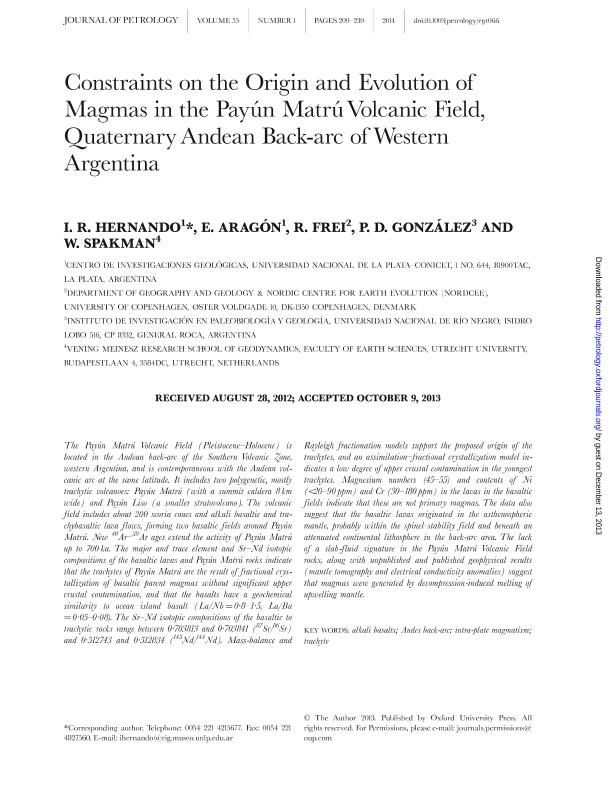Mostrar el registro sencillo del ítem
dc.contributor.author
Hernando, Irene Raquel

dc.contributor.author
Aragon, Eugenio

dc.contributor.author
Frei, Robert

dc.contributor.author
Gonzalez, Pablo Diego

dc.contributor.author
Spakman, W.
dc.date.available
2017-11-07T15:55:32Z
dc.date.issued
2013-12-11
dc.identifier.citation
Hernando, Irene Raquel; Aragon, Eugenio; Frei, Robert; Gonzalez, Pablo Diego; Spakman, W.; Constraints on the origin and evolution of magmas in the Payún Matrú Volcanic Field, Quaternary andean back-arc of western Argentina; Oxford University Press; Journal Of Petrology; 55; 1; 11-12-2013; 209-309
dc.identifier.issn
0022-3530
dc.identifier.uri
http://hdl.handle.net/11336/27734
dc.description.abstract
The Payún Matrú Volcanic Field (Pleistocene–Holocene) is located in the Andean back-arc of the Southern Volcanic Zone, western Argentina, and is contemporaneous with the Andean volcanic arc at the same latitude. It includes two polygenetic, mostly trachytic volcanoes: Payún Matrú (with a summit caldera 8 km wide) and Payún Liso (a smaller stratovolcano). The volcanic field includes about 200 scoria cones and alkali basaltic and trachybasaltic lava flows, forming two basaltic fields around Payún Matrú. New 40Ar–39Ar ages extend the activity of Payún Matrú up to 700 ka. The major and trace element and Sr–Nd isotopic compositions of the basaltic lavas and Payún Matrú rocks indicate that the trachytes of Payún Matrú are the result of fractional crystallization of basaltic parent magmas without significant upper crustal contamination, and that the basalts have a geochemical similarity to ocean island basalt (La/Nb = 0·8–1·5, La/Ba = 0·05–0·08). The Sr–Nd isotopic compositions of the basaltic to trachytic rocks range between 0·703813 and 0·703841 (87Sr/86Sr) and 0·512743 and 0·512834 (143Nd/144Nd). Mass-balance and Rayleigh fractionation models support the proposed origin of the trachytes, and an assimilation–fractional crystallization model indicates a low degree of upper crustal contamination in the youngest trachytes. Magnesium numbers (45–55) and contents of Ni (<20–90 ppm) and Cr (30–180 ppm) in the lavas in the basaltic fields indicate that these are not primary magmas. The data also suggest that the basaltic lavas originated in the asthenospheric mantle, probably within the spinel stability field and beneath an attenuated continental lithosphere in the back-arc area. The lack of a slab-fluid signature in the Payún Matrú Volcanic Field rocks, along with unpublished and published geophysical results (mantle tomography and electrical conductivity anomalies) suggest that magmas were generated by decompression-induced melting of upwelling mantle.
dc.format
application/pdf
dc.language.iso
eng
dc.publisher
Oxford University Press

dc.rights
info:eu-repo/semantics/openAccess
dc.rights.uri
https://creativecommons.org/licenses/by-nc-sa/2.5/ar/
dc.subject
Alkaline Basalts
dc.subject
Andes Back-Arc
dc.subject
Intraplate
dc.subject
Trachytes
dc.subject.classification
Oceanografía, Hidrología, Recursos Hídricos

dc.subject.classification
Ciencias de la Tierra y relacionadas con el Medio Ambiente

dc.subject.classification
CIENCIAS NATURALES Y EXACTAS

dc.title
Constraints on the origin and evolution of magmas in the Payún Matrú Volcanic Field, Quaternary andean back-arc of western Argentina
dc.type
info:eu-repo/semantics/article
dc.type
info:ar-repo/semantics/artículo
dc.type
info:eu-repo/semantics/publishedVersion
dc.date.updated
2017-09-29T16:33:55Z
dc.journal.volume
55
dc.journal.number
1
dc.journal.pagination
209-309
dc.journal.pais
Reino Unido

dc.journal.ciudad
Oxford
dc.description.fil
Fil: Hernando, Irene Raquel. Consejo Nacional de Investigaciones Científicas y Técnicas. Centro Científico Tecnológico Conicet - La Plata. Centro de Investigaciones Geológicas. Universidad Nacional de La Plata. Facultad de Ciencias Naturales y Museo. Centro de Investigaciones Geológicas; Argentina
dc.description.fil
Fil: Aragon, Eugenio. Consejo Nacional de Investigaciones Científicas y Técnicas. Centro Científico Tecnológico Conicet - La Plata. Centro de Investigaciones Geológicas. Universidad Nacional de La Plata. Facultad de Ciencias Naturales y Museo. Centro de Investigaciones Geológicas; Argentina
dc.description.fil
Fil: Frei, Robert. Universidad de Copenhagen; Dinamarca
dc.description.fil
Fil: Gonzalez, Pablo Diego. Universidad Nacional de Río Negro. Sede Alto Valle. Instituto de Investigaciones en Paleobiología y Geología; Argentina
dc.description.fil
Fil: Spakman, W.. Utrecht University; Países Bajos
dc.journal.title
Journal Of Petrology

dc.relation.alternativeid
info:eu-repo/semantics/altIdentifier/doi/http://dx.doi.org/10.1093/petrology/egt066
dc.relation.alternativeid
info:eu-repo/semantics/altIdentifier/url/https://academic.oup.com/petrology/article/55/1/209/1530346
Archivos asociados
